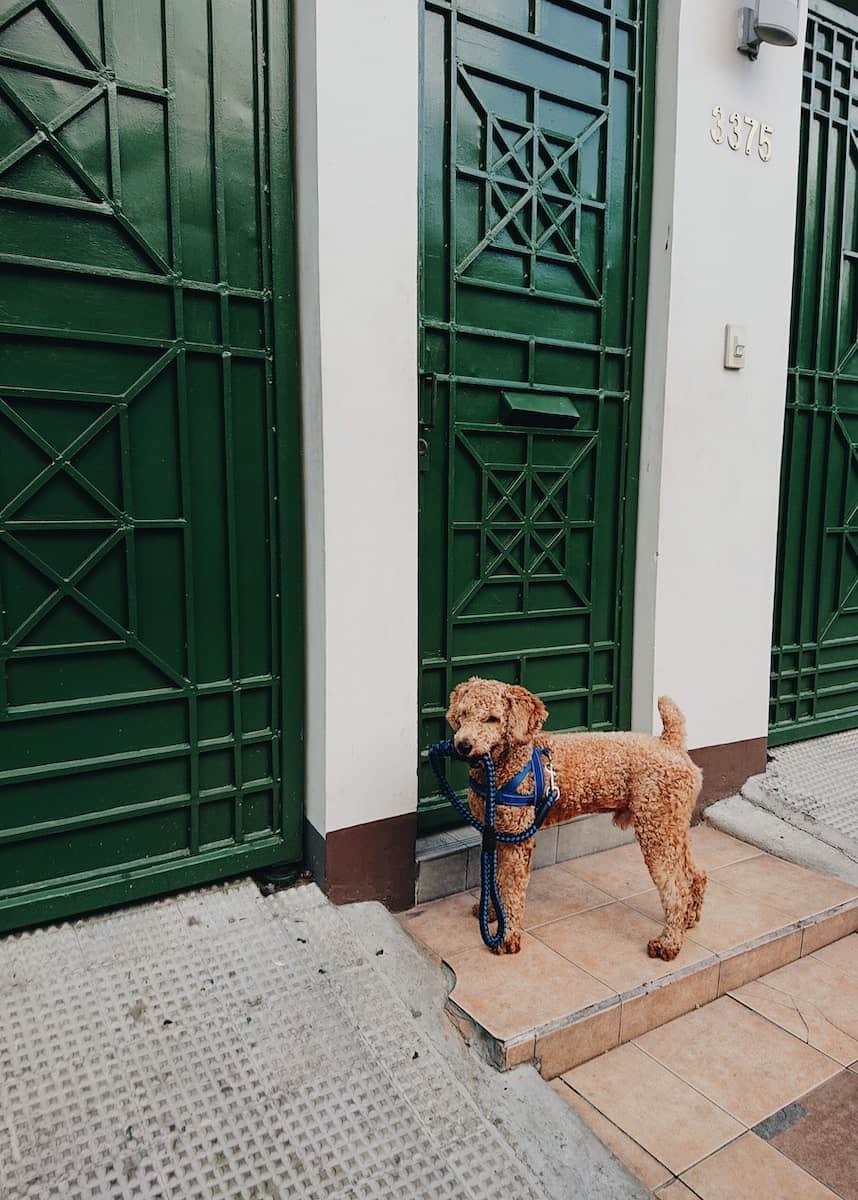
Are you looking for a loyal companion with intelligence, trainability, and low-maintenance grooming needs? Adopting a poodle could be the perfect choice! Poodles are often overlooked, but they make wonderful pets and offer an incredible opportunity to provide a second chance at life. From finding the right vet or veterinary clinic to setting up a routine that suits both you and your new pet, this guide provides everything you need to know about adopting a poodle.
From Our Experience: As poodle enthusiasts who have worked with hundreds of poodle owners and rescue organizations over the years, we’ve gathered real-world insights that go beyond textbook knowledge. The information in this article reflects both professional expertise and hands-on experience with poodles of all sizes and temperaments.
What is a Poodle?
Poodles are a popular breed of dog that comes in three sizes: Standard, Miniature and Toy. Many poodle have the same distinctive curly coat and bright eyes, as well as being highly intelligent, trainable and low-maintenance when it comes to their grooming needs. Poodles are also known for their loyalty and affectionate nature, making them an ideal companion for families or individuals looking for a pet. A wide variety of colors and patterns can be found in the breed, including solid black, white, cream, apricot and silver tones. No matter what size or color you choose, you will find a loyal friend with a poodle!
Adopting a Poodle – A Second Chance at Life
Adopting a poodle can be a rewarding experience for both the pet and their new family. For many homeless animals, it is a chance at life. With the help of dedicated foster homes, nonprofit organizations, and animal shelters, more and more poodles are being given a second chance at finding a forever home.
When considering adoption, potential adopters should keep in mind that there is an adoption fee associated with taking home their new pet. This fee helps cover the cost of vaccinations, tick treatment and other medical expenses that come along with taking in an animal from the shelter. Besides this cost, adoptive families will also need to provide their new pet with love and attention to ensure they grow up happy and healthy.
Those interested in adopting should speak to an adoption counselor or foster parent who can guide them through the process. They will help match them with a rescue dog that best suits their lifestyle and answer questions they may have about caring for their poodle. With just a little research and dedication, anyone can become a passionate animal lover!
For those seeking additional support during the adoption process or after bringing home their furry friend, consider visiting one of the many VCA Animal Hospitals throughout North America. There you’ll find expert advice on all things related to your pet’s health, e.g. nutrition and/or grooming tips, access to age-appropriate vaccinations and treatments if needed. Many cities have animal rescue teams or welfare leagues that do amazing work for single animals or entire litters of puppies looking for homes!
Benefits of Adopting a Poodle
Adopting a poodle can be an incredibly rewarding experience for both the pet and their new family. Not only will it allow them to provide a loving home for an animal in need, but there are also many benefits associated with adopting a poodle that makes it an ideal choice for those looking to add a furry friend to their family.
One notable benefit of adopting a poodle is that they come in a wide variety of shapes, sizes, and colors. This means potential adopters can choose the perfect pup to fit into their home and lifestyle. Poodles are also known for being highly intelligent, making them easy to train and obedient when given the right direction.
Another great perk of adoption is that it helps keep homeless animals off the streets and out of overcrowded shelters. Adoption fees help cover medical expenses that come along with taking in a rescue dog, giving them much-needed care before finding their forever home.
Ultimately, when you adopt a poodle you’re providing them with the chance at having a happy and healthy life – something every pet deserves!
Companionship
Adopting a poodle can provide the perfect companion for those who want to share their life with a furry friend. Poodles are known for being loyal companions who enjoy spending time with their families and providing unconditional love and support. They are also incredibly intelligent and easy to train, making them an ideal pet for people of all ages.
Adopting a poodle can be a great way to make sure your new pup is well taken care of from day one. Animal shelters typically provide age-appropriate vaccinations, tick treatment, and other necessary care during the adoption process. Many nonprofit organizations offer foster homes and families for animals in need before they find their forever home.
If you’re looking for a loyal companion that will bring joy to your life, look no further than adopting a poodle! With proper training, guidance, and lots of love, you’ll have a loyal friend by your side that will remain devoted to you throughout their lifetime.
Intelligence and Trainability
Poodles are incredibly intelligent and easy to train, making them an ideal pet for people of all ages. Their intelligence and willingness to learn new things makes them a great choice for those looking for an obedient companion. With the right training, poodles can easily learn commands such as “sit”, “come”, and “stay” in no time at all. They are also keen to please their owners, which makes them easier to train than other breeds. Poodles have strong problem-solving skills that can help make training sessions more enjoyable.
Whether you’re looking for a pup that will stay within your property boundaries or one that can perform specific tricks, adopting a poodle can be a great way to get exactly what you want from your pet. With patience, dedication and positive reinforcement techniques such as treats and praise, poodles can quickly become well-behaved companions who understand their owner’s commands with ease.
Low-Maintenance Grooming Needs
Poodles are known for their low-maintenance grooming needs. With regular brushing and occasional trims, poodle coats can stay healthy and beautiful with minimal effort. They have a wide variety of coat lengths, ranging from the traditional curly “poodle cut” to longer hair that requires less frequent brushing or trimming. They only need to be bathed every 4-6 weeks depending on their environment, allowing owners to avoid the hassle of frequent baths.
Poodles also require very little in terms of professional grooming services when compared to other breeds. This makes them a great option for those who don’t have the time or money to invest in more specialized services, such as clipping and shaping. Plus, since poodles don’t shed like many other breeds, they are ideal for people with allergies who want a pet but cannot tolerate shedding fur.
Overall, adopting a poodle is an excellent choice for those looking for a loving companion who doesn’t require too much maintenance. With their intelligence and trainability combined with their low-maintenance grooming needs, poodles are sure to bring joy and companionship into any household.
Health and Exercise Requirements
Poodles have an average lifespan of 12-15 years, making them a great long-term commitment if you are looking for a loyal companion. To ensure that your poodle lives its best life, it is important to be aware of their health and exercise requirements.
Poodles should receive age-appropriate vaccinations and regular check-ups with a veterinarian to help keep them healthy and avoid any potential illnesses or diseases. In addition, they should also receive tick treatments during the warmer months to protect them from parasites.
In terms of exercise, poodles require daily walks and playtime in order to stay active and fit. It’s important to make sure your pup gets enough physical activity as this helps keep their minds sharp and reduces boredom, which can lead to destructive behaviors. Engaging in activities such as ability or fly ball is a great way for your dog to get both mental and physical stimulation while having fun!
Overall, it is important that owners take the time to understand their poodle’s health and exercise needs in order to provide them with the care they need for a happy life. With proper nutrition, regular vet visits, daily walks/playtime sessions, and occasional trips to the dog park, your poodle will thank you for providing them with an enriched lifestyle!
Where to Find Adoptable Poodles
Adopting a poodle can be a rewarding experience for both the pet and the owner. Poodles are highly intelligent, loyal, and make excellent companions. Fortunately, there are a variety of ways to find adoptable poodles.
The first place to look is at local animal shelters or animal rescues. Animal shelters often have a wide variety of animals available for adoption, including poodles of all sizes and ages. It’s important to remember that these animals may have been neglected or abandoned, so it’s essential to take your time in selecting one that’s right for you.
Another option is to contact local nonprofit organizations that specialize in rescuing animals such as VCA Animal Hospitals or the Animal Welfare League. These groups often work closely with community foster families who provide temporary homes for pets while they wait to be adopted. There are also online databases such as Petfinder which allow potential adopters to search through thousands of adoptable animals in their area.
Finally, those looking for an adult poodle can also consider adopting from rescue programs specifically focused on providing second chances at life for homeless animals. Programs like “Rescue Me Paws” offer rescued dogs up for adoption with an adoption fee covering medical care and other costs associated with finding them a home.
No matter where you decide to look, it’s important to remember that adopting an animal is not only about giving them a second chance but also about finding the perfect fit for you and your family!
Animal Shelters and Rescues
Animal shelters and rescues are a great place to find adoptable poodle puppies and adults alike. When looking for a poodle, it’s important to make sure that the animal has received age-appropriate vaccinations and tick treatment. Many shelters also offer adoption counseling services to ensure that both the pet and adoptive family are well-suited for one another.
For those looking for an adult poodle, there are rescue programs specifically geared towards giving homeless animals a second chance at life. These programs provide medical care, spaying/neutering, and other necessary costs associated with finding them a home.
No matter where you decide to look for a poodle, it’s essential that you do your research beforehand and consult with an experienced veterinarian or adoption counselor before bringing your new pup home. With the help of passionate animal lovers working hard in animal shelters and rescues all around the world, these animals can have the opportunity for a loving home and happy life!
Foster Homes and Families
Foster homes and families are a great way to give homeless poodles the second chance they deserve. Foster parents provide temporary care for rescue dogs while they wait to find their forever home. This helps reduce the burden on shelters, which are often overcrowded. Additionally, fostering gives potential adopters a chance to get to know the poodle’s personality and understand if it will be a good fit for their family before committing.
Foster families come in all shapes and sizes, from single people who have time and space to offer a pup in need of love, to larger households that can handle multiple foster pets at once. The most important thing is that each foster pet receives the care they need in order to become healthy and happy enough for adoption into their forever home.
Fostering not only provides a loving environment for these animals until they find their permanent home, but also opens up more space in shelters so other homeless pups can have their chance too!
Nonprofit Organizations Supporting Poodle Adoption
Nonprofit organizations are instrumental in helping give poodles a second chance. These organizations provide resources to shelters and rescue groups, helping them care for homeless animals until they find a forever home. They also offer financial support for adoption fees and veterinary costs, such as age-appropriate vaccinations and tick treatments.
These nonprofits connect passionate animal lovers with adoptable animals and provide assistance throughout the entire adoption process. They match up potential adoptive families with the perfect shelter pet based on their lifestyle and preferences. Additionally, many of these organizations have trained adoption counselors on staff who can answer questions about the breed or help families understand any special needs a poodle may have.
With so many dedicated nonprofit organizations out there, there’s no shortage of opportunities to support poodle adoption! From vca animal hospitals to animal rescue teams to the animal welfare league, there’s a wide variety of ways you can get involved in giving homeless poodles the happy life they deserve.
Preparing for Your New Pet’s Arrival
When you bring home a new pet, it’s important to take the time to prepare for their arrival. This includes understanding their needs and preparing your home for their unique lifestyle. A poodle is a high energy dog that needs plenty of exercise and stimulation. Make sure your home has enough space for him to run and play, as well as toys and other activities that will keep him occupied. Equip your home with items like water dishes, a scratching post, and a place for him to sleep on a soft bed. And be sure to have a veterinarian check your pup into their health plan as soon as they arrive.
Budgeting for an Adoption Fee
When adopting a pet, it’s important to budget for the cost of the adoption fee. Adoption fees help cover costs associated with rescuing and caring for animals, such as veterinary care, vaccinations, spaying/neutering and microchipping. Depending on the organization you are working with and the breed of animal you’re adopting, the fees can range from $50 to $500 or more. It is also important to factor in additional costs like food, toys and other supplies that will be needed to care for your new pet. To make sure you’re prepared when bringing home your pet, plan ahead by researching potential organizations and their adoption fees so that you are able to budget appropriately.
Ensuring Age-Appropriate Vaccinations are Up to Date
It is important to ensure that your newly adopted pet has all of its age-appropriate vaccinations up to date before bringing them home. Vaccinations are a key part of keeping your pet safe and healthy and protecting it from infectious diseases. Many organizations will not allow a pet to leave their facility until they have received all necessary vaccinations. Before adopting, ask the organization if the pet has received all of its vaccinations, and make sure that any paperwork associated with the adoption includes details about the type and dates of the vaccines administered. If you are unsure about what vaccinations your pet needs, contact an experienced adoption counselor or veterinarian who can help guide you through the process. Many organizations offer free or discounted tick treatment for rescue dogs as part of their adoption package – be sure to ask about this when adopting!
Setting Up an Appointment for Tick Treatment (if necessary)
If you’re adopting a pet from a shelter or rescue organization, it’s important to make an appointment for tick treatment as part of the adoption process. Many shelters and rescue organizations offer discounted tick treatment as part of their adoption packages, and it’s important to be aware of this so you can make the most informed decision about whether or not to bring your new pet home. If you live in an area where ticks are common, be sure to take precautions when walking your pet, including using insect repellent and wearing long-sleeved shirts and pants. If you’re ever unsure about whether or not your pet has been bitten by a tick, contact your veterinarian for advice.
The Adoption Process
When you adopt a pet from a shelter or rescue organization, it’s important to make an appointment for tick treatment as part of the adoption process. Many shelters and rescue organizations offer discounted tick treatment as part of their adoption packages, and it’s important to be aware of this so you can make the most informed decision about whether or not to bring your new pet home. If you live in an area where ticks are common, be sure to take precautions when walking your pet, including using insect repellent and wearing long-sleeved shirts and pants. If you’re ever unsure about whether your pet has been bitten by a tick, contact your veterinarian for advice.
Working with an Adoption Counselor
When you adopt a pet from a shelter or rescue organization, it’s important to make an appointment for tick treatment as part of the adoption process. Many shelters and rescue organizations offer discounted tick treatment as part of their adoption packages, and it’s important to be aware of this so you can make the most informed decision about whether or not to bring your new pet home. If you live in an area where ticks are common, be sure to take precautions when walking your pet, including using insect repellent and wearing long-sleeved shirts and pants. If you’re ever unsure about whether your pet has been bitten by a tick, contact your veterinarian for advice.
Working with an adoption counselor is an excellent way to ensure that you have all the information you need before making your decision about whether to adopt a pet. An adoption counselor will help guide you through the entire adoption process and answer questions that you may have. They’ll also be happy to provide you with contact information for other nonprofit animal organizations that may help meet the needs of your new pet.
Meeting Potential Foster Parents and Potential Adopters
Before committing to any adoption, it is important to meet with both the foster parent who has been taking care of the animal and potential adopters. This will give everyone the opportunity to ask questions and get to know each other. Foster parents can share information about the pet’s likes, dislikes, and personality traits, while potential adopters can learn about the type of home they can offer.
When meeting with potential adopters, it is important that they understand all the responsibilities that come with adopting a pet. This includes regular vet visits, age-appropriate vaccinations, and adequate exercise. Potential adopters should also know any special needs the pet may have. Discussing an adoption fee helps both parties understand the financial commitment of caring for an animal companion.
By taking these steps prior to adoption, everyone involved can knowing that their new furry friend will have a happy life in their forever home!
Caring for Your Newly Adopted Pet at Home
Once you have adopted a pet, it is important to provide them with the best possible care. It’s important to find a vet or veterinary clinic you trust for your pet’s health and happiness. You should also make sure that your new pet has access to basic supplies like food, water, beds, toys, and treats. Regular grooming and parasite prevention are essential for keeping your pet healthy and happy.
Besides taking care of your pet’s basic needs, it’s important to be aware of any health issues they might have and take precautions to keep them safe. If you’re not sure how to care for your new pet, talk to an adoption counselor or an animal lover for advice. With the right resources and knowledge, you can give your newly adopted pet the best chance at life!
Tips for Making the Most Out of Your Newly Adopted Pet’s Life
When adopting a pet, it is important to make the most out of your new friend’s life. To do this, you must create a bond and spend quality time with your dog. This can include daily walks, playtime, grooming sessions or simply sitting together on the couch. It is also beneficial to establish a routine that works for both you and your pet. Playing fetch, tug-of-war, or swimming with your pup will strengthen your bond.
Besides spending time together, it is also important to look into any vaccinations or treatments that may be necessary for your pet’s age and breed. For example, if you have adopted an older poodle, they may require tick treatment more often than other breeds. Last, provide plenty of treats and snacks throughout the day – this will keep them happy and show them how much you appreciate their friendship! With these tips in mind, you can ensure that both you and your newly adopted pet have an enjoyable experience together as you embark on this exciting journey!





